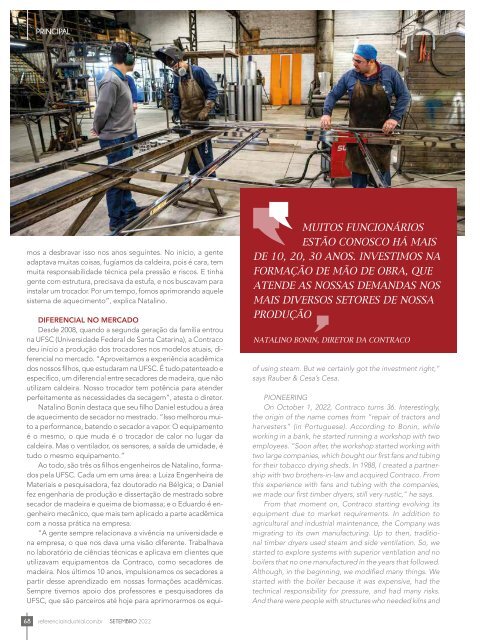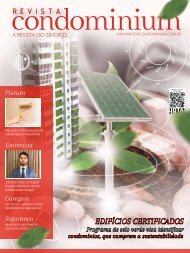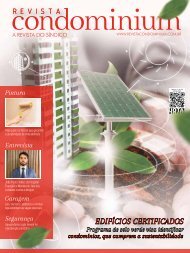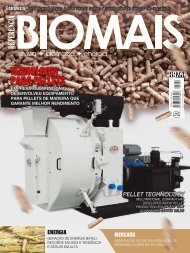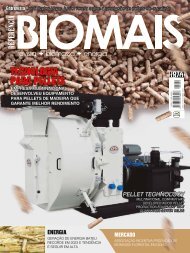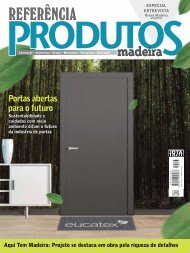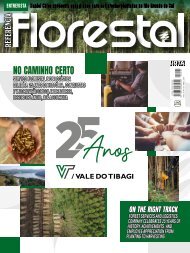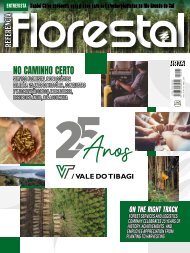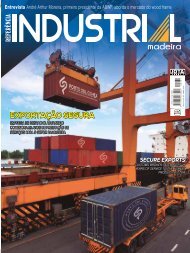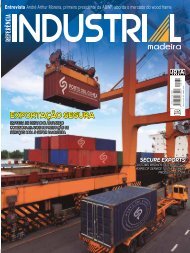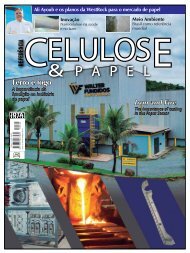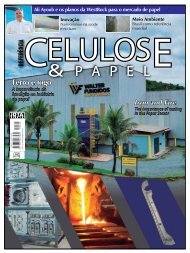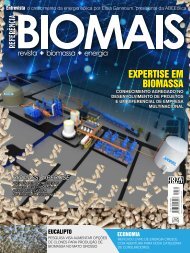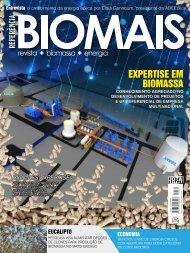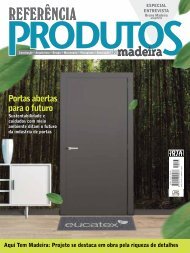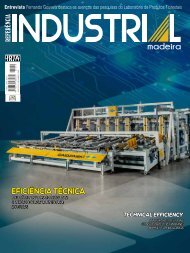You also want an ePaper? Increase the reach of your titles
YUMPU automatically turns print PDFs into web optimized ePapers that Google loves.
PRINCIPAL<br />
mos a desbravar isso nos anos seguintes. No início, a gente<br />
adaptava muitas coisas, fugíamos da caldeira, pois é cara, tem<br />
muita responsabilidade técnica pela pressão e riscos. E tinha<br />
gente com estrutura, precisava da estufa, e nos buscavam para<br />
instalar um trocador. Por um tempo, fomos aprimorando aquele<br />
sistema de aquecimento”, explica Natalino.<br />
MUITOS FUNCIONÁRIOS<br />
ESTÃO CONOSCO HÁ MAIS<br />
DE 10, 20, 30 ANOS. INVESTIMOS NA<br />
FORMAÇÃO DE MÃO DE OBRA, QUE<br />
ATENDE AS NOSSAS DEMANDAS NOS<br />
MAIS DIVERSOS SETORES DE NOSSA<br />
PRODUÇÃO<br />
NATALINO BONIN, DIRETOR DA CONTRACO<br />
of using steam. But we certainly got the investment right,”<br />
says Rauber & Cesa’s Cesa.<br />
PIONEERING<br />
On October 1, 2022, Contraco turns 36. Interestingly,<br />
the origin of the name comes from “repair of tractors and<br />
harvesters” (in Portuguese). According to Bonin, while<br />
working in a bank, he started running a workshop with two<br />
employees. “Soon after, the workshop started working with<br />
two large companies, which bought our first fans and tubing<br />
for their tobacco drying sheds. In 1988, I created a partnership<br />
with two brothers-in-law and acquired Contraco. From<br />
this experience with fans and tubing with the companies,<br />
we made our first timber dryers, still very rustic,” he says.<br />
From that moment on, Contraco starting evolving its<br />
equipment due to market requirements. In addition to<br />
agricultural and industrial maintenance, the Company was<br />
migrating to its own manufacturing. Up to then, traditional<br />
timber dryers used steam and side ventilation. So, we<br />
started to explore systems with superior ventilation and no<br />
boilers that no one manufactured in the years that followed.<br />
Although, in the beginning, we modified many things. We<br />
started with the boiler because it was expensive, had the<br />
technical responsibility for pressure, and had many risks.<br />
And there were people with structures who needed kilns and<br />
DIFERENCIAL NO MERCADO<br />
Desde 2008, quando a segunda geração da família entrou<br />
na UFSC (Universidade Federal de Santa Catarina), a Contraco<br />
deu início a produção dos trocadores nos modelos atuais, diferencial<br />
no mercado. “Aproveitamos a experiência acadêmica<br />
dos nossos filhos, que estudaram na UFSC. É tudo patenteado e<br />
específico, um diferencial entre secadores de madeira, que não<br />
utilizam caldeira. Nosso trocador tem potência para atender<br />
perfeitamente as necessidades da secagem”, atesta o diretor.<br />
Natalino Bonin destaca que seu filho Daniel estudou a área<br />
de aquecimento de secador no mestrado. “Isso melhorou muito<br />
a performance, batendo o secador a vapor. O equipamento<br />
é o mesmo, o que muda é o trocador de calor no lugar da<br />
caldeira. Mas o ventilador, os sensores, a saída de umidade, é<br />
tudo o mesmo equipamento.”<br />
Ao todo, são três os filhos engenheiros de Natalino, formados<br />
pela UFSC. Cada um em uma área: a Luiza Engenheira de<br />
Materiais e pesquisadora, fez doutorado na Bélgica; o Daniel<br />
fez engenharia de produção e dissertação de mestrado sobre<br />
secador de madeira e queima de biomassa; e o Eduardo é engenheiro<br />
mecânico, que mais tem aplicado a parte acadêmica<br />
com a nossa prática na empresa.<br />
“A gente sempre relacionava a vivência na universidade e<br />
na empresa, o que nos dava uma visão diferente. Trabalhava<br />
no laboratório de ciências técnicas e aplicava em clientes que<br />
utilizavam equipamentos da Contraco, como secadores de<br />
madeira. Nos últimos 10 anos, impulsionamos os secadores a<br />
partir desse aprendizado em nossas formações acadêmicas.<br />
Sempre tivemos apoio dos professores e pesquisadores da<br />
UFSC, que são parceiros até hoje para aprimorarmos os equipamentos”,<br />
elogia Eduardo Bonin, engenheiro responsável<br />
pela Contraco e filho de Natalino.<br />
Com 40 funcionários, a Contraco terceiriza apenas alguns<br />
processos que podem ser abertos. “Já trazemos materiais<br />
cortados, praticamente como uma montadora, resguardando<br />
na empresa a essência da linha de produção. E temos baixa<br />
rotatividade, muitos funcionários estão conosco há mais de<br />
10, 20, 30 anos. Investimos na formação de mão de obra, que<br />
atende as nossas demandas nos mais diversos setores de<br />
nossa produção.”<br />
DIFERENCIAIS DO PRODUTO<br />
Preocupada com a sustentabilidade e questões ambientais,<br />
a Contraco oferece em seus secadores um sistema de retenção<br />
de partículas, no intuito de mitigar a emissão de “fuligem”<br />
para a atmosfera. “Oferecemos esse filtro de saída, de retenção<br />
de partículas, para esse aspecto ambiental. Depende<br />
da biomassa queimada, o equipamento da forma original já<br />
atende as questões ambientais, porém com opcional de filtro<br />
multiclone, a estufa fica preparada para queima de combustíveis<br />
de menor valor agregado como, por exemplo, serragem<br />
granulada, que muitas vezes é um passivo para a madeireira’’,<br />
explica Eduardo Bonin.<br />
Na linha de secadores, o sistema de alimentação da empresa<br />
é outro diferencial. “Antigamente, era necessário encher um<br />
pequeno reservatório manualmente. Hoje, temos uma rosca<br />
alimentadora, que permite a auto alimentação, diretamente<br />
do solo com uma moega simples. Ergonomicamente é muito<br />
melhor, o equipamento ganha autonomia e se alimenta sozinho,<br />
sem aquele operador enchendo carrinho com trabalho<br />
braçal. O operador acaba monitorando do que efetivamente<br />
operando, o que muda o perfil dos clientes”, elogia Natalino.<br />
Com sede em Agrolândia (SC), a ADS Florestal é uma das<br />
empresas que utiliza o secador industrial da Contraco. “Em setembro,<br />
vai fazer um ano que estamos usando o equipamento.<br />
Hoje, levamos 70h (horas) para secar 60 m 3 (metros cúbicos),<br />
mesma quantidade de madeira que antes levávamos 20 dias,<br />
no verão, e de 30 a 45 dias na umidade do inverno”, compara<br />
were looking for us to install a heat exchanger. So, we just<br />
improved their heating system,” explains Natalino Bonin.<br />
MARKET DIFFERENTIAL<br />
In 2008, when the second generation of the family started<br />
school at the Federal University of Santa Catarina (Ufsc),<br />
Contraco started the production of the current models of<br />
heat exchangers, different from those in the market. “We<br />
took advantage of our children’s academic experience, who<br />
had studied at Ufsc. It is all patented and specific, a differential<br />
in timber dryers, which do not use a boiler. Our heat<br />
exchanger has the power to meet drying needs perfectly,”<br />
attests Natalino Bonin.<br />
Bonin points out that his son Daniel studied dryer heating<br />
for his Master’s degree. “This greatly improved the<br />
performance by beating the steam dryer. The equipment is<br />
the same. What changes is the heat exchanger in place of<br />
a boiler. But the fan, the sensors, and the humidity output<br />
all use the same equipment.<br />
In all, Natalino Bodin’s three children Ufsc engineers<br />
are working with him. Each in an area: Luiza, Materials Engineer<br />
and researcher with her Ph.D. from Belgium; Daniel,<br />
graduate in Production Engineering and Master’s in timber<br />
drying and biomass burning; and Eduardo, a Mechanical<br />
Engineering graduate, who has used his studies in the<br />
Company the most.<br />
“We always related to our university and company<br />
experience, which gave us a different view. I worked in the<br />
technical science lab and applied it to customers who used<br />
Contraco equipment, such as timber dryers. Over the past<br />
ten years, we have produced dryers based on our academic<br />
backgrounds. We have always had the support of Ufsc professors<br />
and scientists, who are partners to this day in equipment<br />
improvements,” acclaims Eduardo Bonin, Engineer<br />
responsible for Contraco and son of Natalino.<br />
With 40 employees, Contraco outsources only a few processes<br />
that can be public. “We already bring cut materials,<br />
practically like an automaker, keeping the essence of the<br />
production line in-house. And we have low turnover, many<br />
employees have been with us for over 10, 20, 30 years. We<br />
invest in employee training to meet our demands in the<br />
most diverse sectors of our production.”<br />
PRODUCT DIFFERENCES<br />
Concerned with sustainability and environmental issues,<br />
Contraco offers a particle retention system in its dryers to<br />
mitigate “soot” emissions to the atmosphere. “We offer<br />
this output filter, particle retention, for the environmental<br />
aspect. But, of course, it depends on the biomass burned.<br />
The equipment in its original form already meets environmental<br />
issues. But with the optional multi-clone filter, the<br />
kiln is prepared for burning fuels of lower added value,<br />
such as rough sawdust, which is often a waste product from<br />
sawmills,” explains Eduardo Bonin.<br />
The Company’s feed system is another differential in<br />
the line of dryers. “In the olden days, it was necessary to fill<br />
a small reservoir manually. Today, we have a screw feeder,<br />
which allows for self-feeding directly from the ground with<br />
a simple grinder. Ergonomically it is much better. The equi-<br />
68 referenciaindustrial.com.br SETEMBRO 2022<br />
SETEMBRO 2022 69


